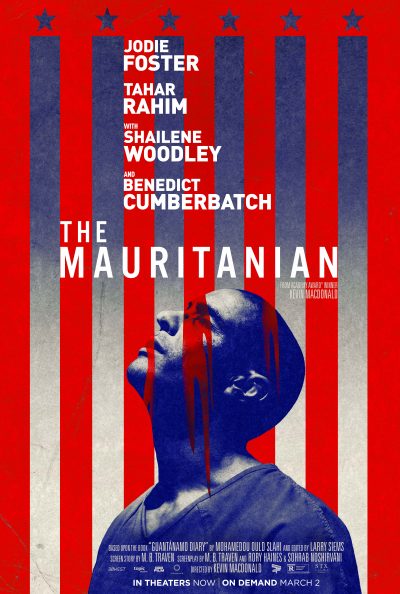
“The Mauritanian”(2021). Cast: Tahar Rahim, Jodie Foster, Benedict Cumberbatch, Shailene Woodley, Zachary Levi, Corey Johnson, Baya Belal. Director: Kevin Macdonald. Screenplay: M.B. Traven, Rory Haines and Sohrab Noshirvani. Story: M.B. Traven. Book: Mohamedou Ould Slahi, Guantánamo Diary, Larry Siems, editor. Web site. Trailer.
Pursuing the truth is indeed a noble endeavor, one that’s made all the more virtuous when infused with passion. That’s particularly crucial when attempts are made to intentionally obscure it and the stakes are high. So it is for an intrepid counselor defending a falsely accused suspect in the fact-based historical drama, “The Mauritanian.”
In the wake of the 9/11 attacks, the government was eager to round up suspects responsible for the event at any cost – and no matter how valid the evidence was against them. The campaign to arrest them was carried out with all deliberate speed, even if the detention and prosecution of said suspects moved at a snail’s pace. Many of the alleged guilty parties were sent to a high-security holding facility at the U.S. military base in Guantanamo, Cuba, where they were essentially locked up with the keys thrown away. During their stay, they were subjected to repeated extreme interrogation tactics in a relentless attempt to extract information from them – information that often was not forthcoming, largely because the supposed evidence collected against them was frequently questionable at best. Some were held for years without ever being charged, yet there was also no way they were going to be released, either. A government hell-bent on exacting justice was itself now guilty of thwarting it toward suspects who were, in fact, innocent. And the only hope these individuals had was to pursue protracted legal battles against a government that routinely put up roadblocks to prevent the truth from emerging – and from justice being served.
So it was for Mohamedou Ould Slahi (Tahar Rahim), a Mauritanian national who was accused of being the key terrorist recruiter for the 9/11 attacks. Yet, as the film reveals, his only “crime” was having minimal, marginal contact with individuals who knew or may have known some of the principal players in those tragic events. Nevertheless, the government felt that, despite the flimsiness of that “evidence,” it was enough to arrest him and detain him at Guantanamo (a.k.a., “Gitmo”). Once there, he was subjected to all of the injustices and indignities described above, with little hope of ever being released.
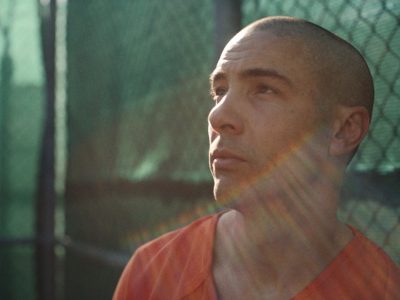
Circumstances changed, however, when attorney Nancy Hollander (Jodie Foster) became involved. When she heard about Slahi’s case, she was initially reluctant to take him on as a client, but, the more she looked into the miscarriage of justice that was playing out, she changed her mind, convincing her law firm to pursue his representation as a pro bono case. With the assistance of her associate, Teri Duncan (Shailene Woodley), the duo began their work on his defense. Little did they realize what they were getting into.
At the same time as Hollander and Duncan were preparing their representation, the government started ramping up its prosecution, led by Lt. Col. Stuart Couch (Benedict Cumberbatch), a Marine Corps lawyer charged with getting a conviction. Under orders from his superior, Col. Bill Seidel (Corey Johnson), Couch initially approached his task with great zeal. But, like Hollander and Duncan, at that point, he had no idea what awaited him.
As each team prepared their cases, they came up against various obstacles. For Hollander and Duncan, just meeting with their client was an ordeal that required them to jump through an array of hoops. And, when they requested copies of discovery materials that the government had compiled against Slahi, they met with delays, bureaucratic red tape and other assorted hindrances, including significant redactions of information that often rendered the documents useless.
But Hollander and Duncan weren’t alone in this. As Couch prepared his prosecution, he often found his hands tied as he attempted to build a case with significant pieces of evidence apparently missing. At one point, he met with his friend Neil Buckland (Zachary Levi), a CIA operative whom he believed had access to the missing information. However, no matter how much Couch pressed Buckland, he was continually rebuffed. This stall tactic made him increasingly skeptical about what he was involved in, a conclusion not unlike the one being drawn by his opposing counsel.
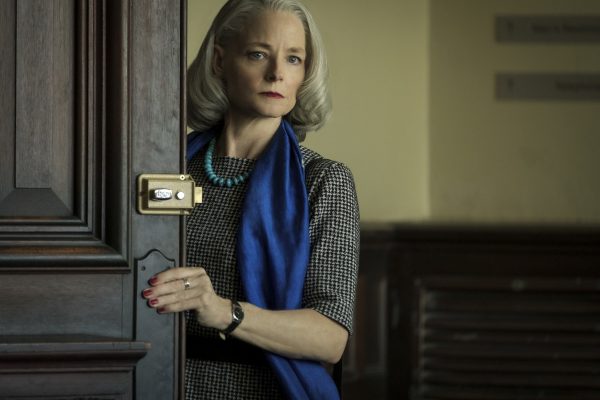
Meanwhile, as all this legal wrangling played out, Slahi continued to languish in Gitmo. As he mused about his future, he reflected on what he had endured up to that point. Through a series of flashbacks, viewers are witness to the atrocities he underwent, both during interrogations and in the intimidation tactics authorities employed to try to get him to talk. And, through it all, still no charges were filed, again because no revelations emerged to substantiate offenses worthy of prosecution.
The longer this process continued, the more apparent it became that the government didn’t have anything on Slahi and that it was intentionally stonewalling both the defense and the prosecution. Was it because authorities didn’t want to admit they made a mistake? Was it an attempt to maintain a façade aimed at making it look like officials were on top of things in their effort to exact justice in the wake of 9/11? Or was it something more sinister, such as a calculated effort at keeping a lid on secrets that the government didn’t want released? Those were the concerns left to be addressed as this story moved toward its conclusion.
Seeking truth and justice – especially where they’re being intentionally undermined – is arguably one of the most noble pursuits in which we can engage. Such circumstances provide ample fodder for justifiable outrage, particularly when the egregious behavior is sanctioned, condoned and carried out by parties (namely, the U.S. government and its operatives) that claim to adhere to principles to the contrary. And those scenarios are made all the worse when they’re purposely thwarted by obstacles that make getting at the truth that much more difficult.
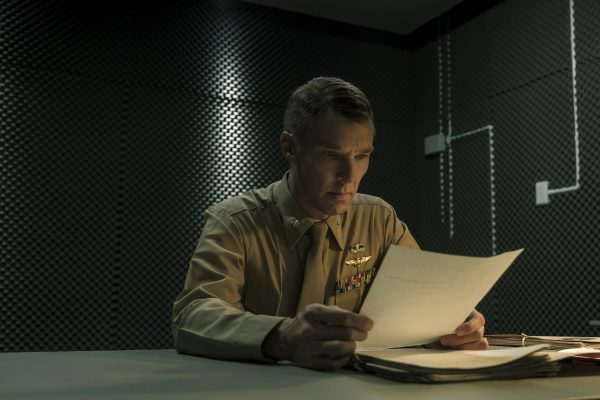
Those who desire to see such blatant transgressions corrected are obviously the ones best suited to seek their rectification. That’s because they believe – often quite passionately – that these intolerable situations must be changed. And, when they invoke these beliefs, they often succeed, given that these intentions are at the core of the conscious creation process, the philosophy that maintains we draw upon these resources in manifesting the reality we experience, including the righting of these wrongs.
One of the qualities that characterizes the beliefs of these strident individuals is that they’re backed by faith. This is the passion that fuels the magnitude of those beliefs, significantly increasing the likelihood of those intentions being fulfilled. This is apparent in the aspirations of both Hollander and Couch; as advocates for their respective parties, they each seek rulings in favor of their particular causes. That comes as no surprise when they’re on opposite sides of the argument. But, when they both begin to suspect something is amiss, it’s impressive to see their combined power, passion and persistence surface. They both draw upon their faith in the notion that justice will prevail, in whatever form it might ultimately take. Such a commitment by both parties is truly inspiring, to say the least.
Developing such faith requires overcoming whatever fears we might have that would hold us back. For Hollander, that means being willing to go up against a seemingly powerful force like the U.S. government, an authority that possesses the means to stop her in her tracks and keep her indefinitely spinning her wheels if it so desires. And, ironically, the same is true for Couch, whose career could potentially be ruined by the institution he loyally serves if he starts to ask too many questions or delves into areas of inquiry from which he’s purposely being excluded. However, if they hope to see their goals realized, they must set aside whatever feelings of intimidation they might have, adopting courageous attitudes to carry them forward.
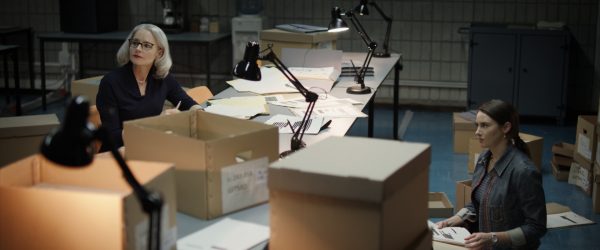
Those perspectives are also driven by a healthy belief in being authentic, abiding by their personal integrity and the principles it embodies. In fact, as champions for the truth, they realistically can’t do otherwise if they want to be able to live with themselves. But, perhaps even more importantly, adhering to such a stance greatly increases the likelihood of realizing their objectives. To believe and act otherwise invites results that are distorted or go unfulfilled. One need only look to the outcomes attained by those who intentionally try to obfuscate matters to see what can happen when an insincere approach is employed.
The attorneys in this story aren’t the only ones whose beliefs reflect these qualities. Slahi does so as well, even if he’s initially discouraged by his chances of clearing his name and obtaining his release. However, once he sees that he has drawn an advocate to his cause, coupled with his fervor for his Islamic faith, he has a powerful mix of beliefs working for him to see his ordeal resolved, despite the efforts to unduly constrain him. The hope he subsequently develops helps him cope with his deplorable circumstances and keeps him focused on attaining the resolution he seeks.
All of the principals in this story thus have an opportunity to live out their value fulfillment, the conscious creation concept associated with being our best, truest selves for the betterment of ourselves and those around us. Even if Hollander, Couch and Slahi have never heard of this principle (or any other conscious creation concept for that matter), they certainly seem to have attained mastery over it. For instance, through their efforts, they have drawn attention to the failings inherent in officialdom’s arbitrary, appalling policies and practices, especially when it comes to the treatment of falsely accused innocents. But perhaps even more important is the attitude that Slahi exhibited in the wake of his incarceration – one rooted in forgiveness, even for those who mistreated him and held him without charge for 14 years, a time during which his most heartfelt wish was to see his beloved mother (Baya Belal), who, regrettably, passed away during his captivity. His outlook toward his captors is an enlightened example we could all stand to follow when it comes to our relations with those who have transgressed against us. It’s an act of value fulfillment from which we could all learn a lot.
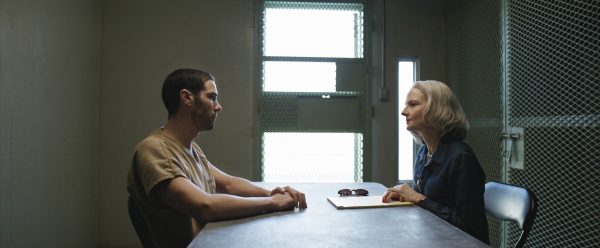
This meticulously detailed account of Slahi’s fraudulent and unspeakable detention is a powerful indictment of the sloppy practices of a government more concerned with convicting someone than with serving justice and uncovering the truth. Director Kevin Macdonald’s thorough treatment of the subject clearly reflects his scrupulous proficiency as a predominantly documentarian filmmaker, exposing the cruelty of officially sanctioned interrogation atrocities and recognizing the efforts of both government and legal crusaders who fought to bring them to light. However, as earnest as that intent is, and as infuriating as the film’s reprehensible revelations are, “The Mauritanian” is at times a little too “clinical” and a bit overlong, periodically becoming mired in excessive legal wrangling that waters down the emotional impact of the narrative. Some judicious editing and a less conventional approach to the material would have strengthened this offering, making its story and insights more compelling. To its credit, though, the film does indeed drive home its message, and its superb performances by Golden Globe Award nominee Rahim and Golden Globe Award winner Foster are worthy of their accolades. The film is available for online streaming.
No matter how deeply we may feel we’ve been wronged, there’s no excuse for projecting our pain onto others who had no involvement in such despicable behavior. That’s true from both an individual and collective perspective. Indeed, the hurt we as a nation suffered from the 9/11 attacks is incalculable, and the perpetrators indeed deserved to be brought to justice. But seeking such a result at any cost can’t be justified when it falsely drags innocent parties into the fray, even when there may be a temptation to brand them guilty simply by association with no hard evidence of wrongdoing. Such initiatives often take on a life of their own, too, making it difficult to restrain them. But, with healthy measures of faith, passion and commitment to revealing the truth in place, the result may well prove vindicating and, above all, just.
Copyright © 2021, by Brent Marchant. All rights reserved.

No comments:
Post a Comment